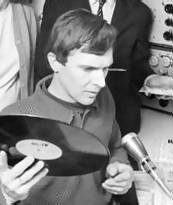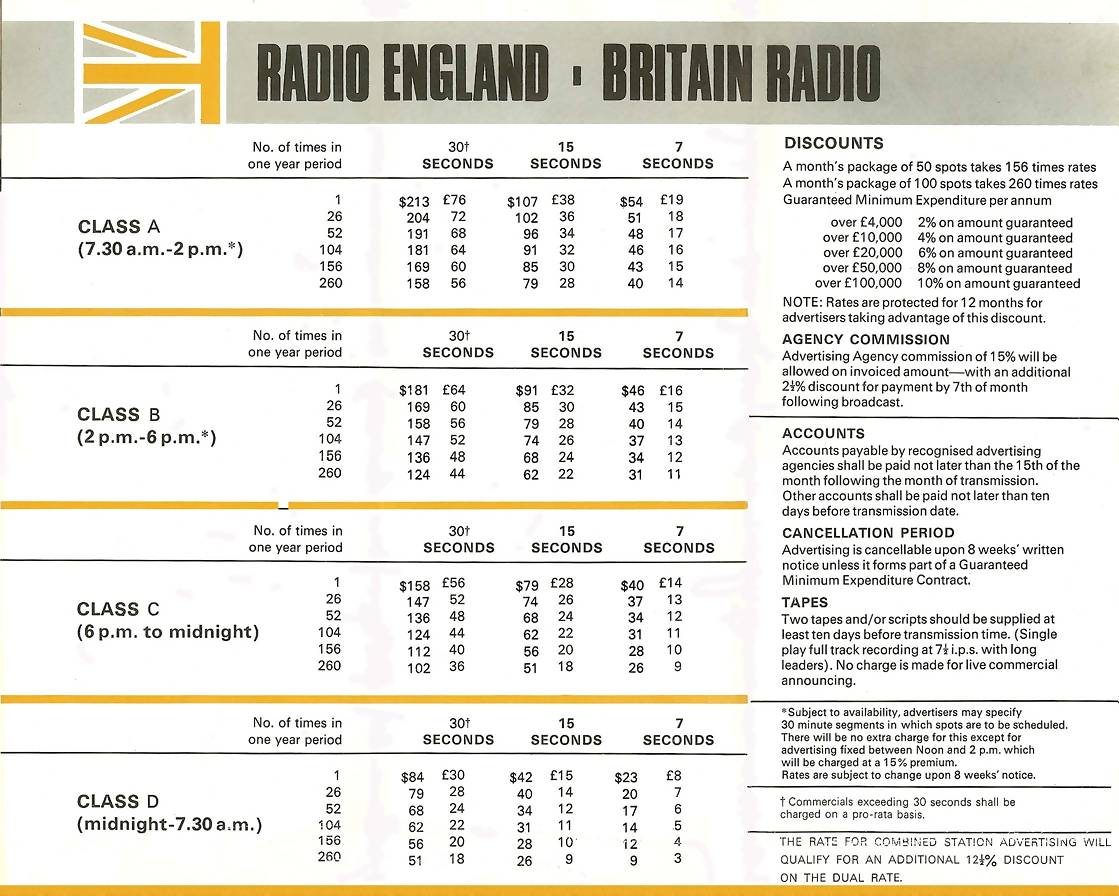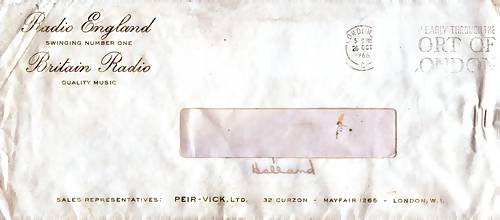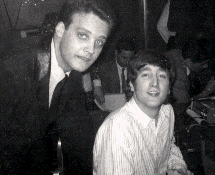Memories now from another one of the original team, Colin Nicol:
|

|
|
Colin Nicol, photographed a couple of months earlier in the studio on board the mv Cheeta II.
|
I had left Caroline - much to (station boss) Ronan's surprise. I know he looked stunned. I feel sure I was the first DJ to resign from the Caroline organisation.
Everyone else (a large number) had been given the flick. A few had left for health reasons or sea sickness, of course. I had just ended my stint on the refurbishment of Cheeta II.
Then I realised I did have nothing to go to and radio pirates were still anything but respectable in early '66. I had thought I'd do some commercials and record stories etc. which I understood was being arranged.
That must have been when I made my first approach to Radio Luxembourg, though that summer relief job did not come up for some months.
Somehow I ended up at the London Hilton. I must have heard about the new station via the grapevine and had phoned and, as I remember, was welcomed by Don Pierson and Bill Vick as an experienced pirate able to
advise and help them as well as broadcast and bring them some of the aura of Caroline, so to speak. As well, they wanted some non-American voices to balance those of the jocks they already had.
The Americans were terrific to deal with - very pleasant people and true to their word. However delays occurred, as had to happen with such complex arrangements, and when we finally got aboard we found ourselves
having to sleep on the floor of a large hold in sleeping bags etc.. Not long afterwards a maze of pine structures were put in place and we had tiered bunks.
The exciting things for me about the Olga Patricia's fit-out were two-fold. First, there was the unique and powerful transmitting equipment. A quite unique aspect was a piece of equipment which I was told was invented for radar
installations and which was able to split the function of the mast so that two stations could broadcast simultaneously from it.
|

|
|
Swinging Radio England and Britain Radio advertising rate card kindly provided by Grey Pierson. Click to magnify.
|
The other was the studio equipment, which was my - and probably England's - first encounter with such advanced operation, as well as automated programming. The huge desk was a bit daunting at
first when compared with everything I'd worked before, even in Australia. It was great fun to work it - like playing a Wurlitzer after a concertina.
I did feel, after we had gone on the air, that we were not hitting the spot with listeners and tried to customise the output accordingly but my role as advisor had been overlooked by then and the unprepared
British audience was bombarded with high pressure radio. It was a little too much too soon for many of them. The possibilities were terrific and we had the equipment, the output power and the organisation. It just
needed to be tailored to the more subtle British way of doing things. There's no questioning the enthusiasm and determination of my Yankee friends. It was a great experience for me to work with them. However, as
things were going, I felt I needed a more secure future and had really had enough of seaboard life. I pursued my Luxembourg application and with contacts pulling a few strings, flew to the Grand Duchy on the very
day of the first reading of the Marine Offences Bill in Parliament. I felt that justified my action.
As I try to remember, I believe we had a press launch of the station at the London Hilton, I think in the Beachcomber Bar. I may be wrong in that - life was a bit of a whirl in those days. The whole thing was
professionally done and there is no doubt the arrival of the Americans had a significant influence on the ultimate arrival of local and commercial radio in Britain. From what I hear these days, that still leaves a
good deal to be desired. Bring back Radio England and let's swing again!”
Nowadays record companies have synchronised worldwide release dates for their products but in the sixties American records were often released in the States months before they became available in the UK (and vice
versa). Radio England frequently played the US releases which gave the station a unique sound and meant that it was often ahead of the competition. There are a number of Radio England Boss 40 charts here
and on following pages.
|

|
|
Swinging Radio England and Britain Radio envelope. Click to magnify. Courtesy of Hans Knot.
|
In July 1966 some listening figures were published for all the offshore stations. A survey commissioned by Radio Caroline and carried out by National Opinion Polls estimated Radio England's audience as
2,274,000 and gave Britain Radio a mere 718,000. As the two stations had only been on the air for a matter of weeks when the research was carried out, this could have been interpreted as a major achievement but, compared to the
eight million plus listeners that the survey gave both London and Caroline, potential advertisers were not impressed. Although they managed to attract a few big name accounts, more and more of the stations' revenue came from
special offers (a fishing rod, a watch, a colour portrait of Man From Uncle actor David McCallum, etc.).
During that same month a second group of American disc-jockeys flew in, signed up for the project by Don Pierson. Jack Curtiss was mainly heard on Britain Radio, Bill
Berry, Boom Boom Brannigan and Chuck Blair mainly on Radio England. A fifth member of the party, Jim Henry, did not stay long and
we are not sure if he made an appearance on air at all.
 Chuck Blair on Swinging Radio England, Sunday afternoon 7th August 1966. The recording is an extract from the Offshore Echo's tape Offshore Classics
vol.27, and is used with kind permission (duration 3 minutes 7 seconds)
Chuck Blair on Swinging Radio England, Sunday afternoon 7th August 1966. The recording is an extract from the Offshore Echo's tape Offshore Classics
vol.27, and is used with kind permission (duration 3 minutes 7 seconds)
|

|
|
Ron O'Quinn with John Lennon on the 1966 Beatles tour of the States. Photo kindly provided by Ron. He is pictured with Paul McCartney here.
|
In August, senior DJ Ron O'Quinn left the ship to accompany the Beatles on their final tour of America (see this page). He had problems with immigration
on his return to the UK and, although he did make it back out to the ship, he resigned soon afterwards and headed home.
 Ron O'Quinn on Swinging Radio England, just back from touring the States with The Beatles. The recording is an extract from the Radio Broadcast Library cassette Off Air Collection vol.10. It has been kindly
donated by Lynne Sims from Martin Lynch's collection (duration 2 minutes 55 seconds)
Ron O'Quinn on Swinging Radio England, just back from touring the States with The Beatles. The recording is an extract from the Radio Broadcast Library cassette Off Air Collection vol.10. It has been kindly
donated by Lynne Sims from Martin Lynch's collection (duration 2 minutes 55 seconds)
|

|
|
Rick Randall, left, with one of the Stars of ‘Swinging 66’, Wayne Fontana. Photo from the Don Pierson collection, kindly provided by Grey Pierson.
|
As part of the promotion for Radio England, a national pop package tour, Swinging '66, was sponsored in August 1966. Starring the Small Faces and featuring Crispian St. Peters, Neil
Christian, Dave Berry and Wayne Fontana, the tour was heavily advertised on air. The gigs proved reasonably successful in the south-east of the country, where Radio England could be heard. Unfortunately outside the
station's transmission area, audiences were understandably sparse. The tour proved a financial disaster, losing over £17,000. The station attempted to get some of this back by selling autographed copies of the
left-over concert programmes.
 Jerry Smithwich plays a promotion for Swinging '66. Tape kindly provided by Albie Somerset (duration 2 minutes 5 seconds)
Jerry Smithwich plays a promotion for Swinging '66. Tape kindly provided by Albie Somerset (duration 2 minutes 5 seconds)
 Alan Black on Britain Radio. Recording courtesy of Stuart Russell (duration 2 minutes 36 seconds)
Alan Black on Britain Radio. Recording courtesy of Stuart Russell (duration 2 minutes 36 seconds)
|
